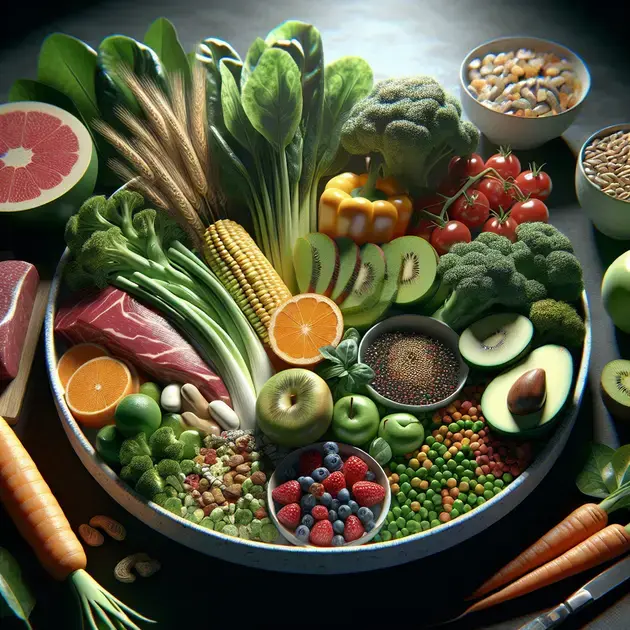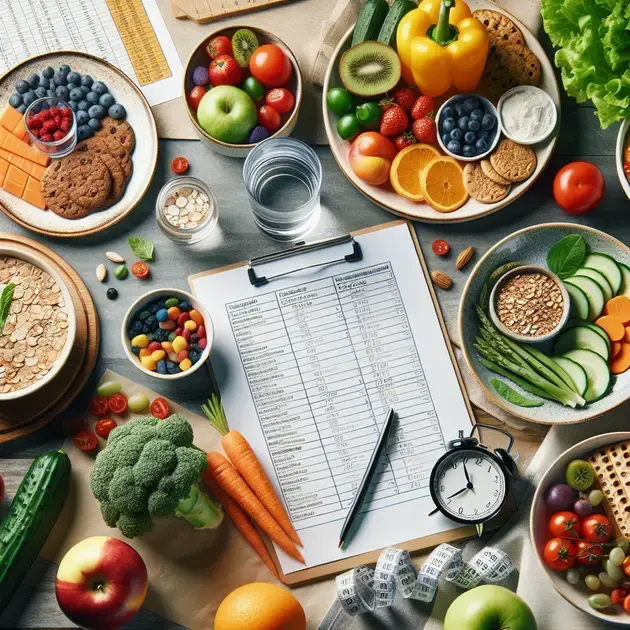When it comes to achieving weight loss goals, one of the most important factors to consider is eating right. Consuming healthy foods plays a crucial role in not only shedding extra pounds but also improving overall well-being.
Choosing nutrient-dense options such as whole grains, lean proteins, fruits, and vegetables can make a significant difference in your weight loss journey. These foods not only provide essential vitamins and minerals but also help keep you feeling full and satisfied.

Eating Right for Weight Loss Success
When it comes to achieving weight loss success, what you eat plays a crucial role. Eating the right foods can help you reach your goals faster and in a healthier way. Here is a step-by-step guide to eating right for weight loss success:
1. Plan Your Meals
One of the keys to eating right for weight loss success is planning your meals ahead of time. This can help you make healthier choices and avoid last-minute unhealthy options. Websites like MyFitnessPal and Lose It! offer meal planning tools and calorie trackers to help you stay on track.
2. Focus on Whole Foods
Instead of processed foods, focus on consuming nutrient-dense whole foods like fruits, vegetables, lean proteins, and whole grains. Apps like Fooducate can help you identify and choose healthier options while grocery shopping.
3. Watch Your Portions
Monitoring your portion sizes is essential for weight loss success. Using apps like Portion Control can help you measure your food accurately and prevent overeating.
4. Stay Hydrated
Drinking an adequate amount of water is important for overall health and weight loss. Waterlogged is a useful app that can remind you to stay hydrated throughout the day.
5. Seek Professional Advice
If you’re struggling to eat right for weight loss, consider consulting a registered dietitian or nutritionist. Apps like Rise offer personalized coaching and support to help you make better food choices.
The Power of Nutrient-Dense Foods
Nutrient-dense foods are packed with essential vitamins and minerals that are beneficial for your overall health and well-being. Incorporating these foods into your diet can have a significant impact on your weight loss journey. Here’s how you can harness the power of nutrient-dense foods:
1. Include a Variety of Colors
When choosing nutrient-dense foods, aim to include a variety of colors on your plate. Apps like Eat the Rainbow can help you track your colorful food intake and ensure you’re getting a wide range of nutrients.
2. Prioritize Leafy Greens
Leafy greens like kale, spinach, and Swiss chard are excellent sources of vitamins and minerals. Incorporate these into your meals regularly to boost your nutrient intake. Websites like ChooseMyPlate provide recipes and tips for incorporating leafy greens into your diet.
3. Opt for Lean Proteins
Proteins like chicken, tofu, and legumes are nutrient-dense and can help keep you full longer. Apps like MyPlate offer protein tracking features to help you meet your daily protein needs while focusing on nutrient density.
4. Don’t Forget Healthy Fats
Incorporating healthy fats from sources like avocados, nuts, and seeds can provide essential nutrients for your body. Use apps like MyFitnessPal to track your fat intake and ensure you’re getting enough healthy fats in your diet.
5. Limit Added Sugars and Processed Foods
Avoiding added sugars and processed foods is crucial when aiming for a nutrient-dense diet. Apps like Sugar Sense can help you monitor your sugar intake and make informed decisions about the foods you consume.

Boost Your Metabolism with Nourishing Foods
Boosting your metabolism with nourishing foods is a crucial step towards achieving your health and wellness goals. By incorporating the right types of foods into your diet, you can rev up your body’s natural fat-burning abilities and improve your overall energy levels. One key component of a metabolism-boosting diet is incorporating plenty of nutrient-dense whole foods such as fruits, vegetables, lean proteins, and whole grains.
When it comes to supercharging your metabolism, foods rich in antioxidants like berries, nuts, and green tea can be highly beneficial. These foods help combat oxidative stress in the body, which can slow down metabolism and contribute to weight gain. Additionally, spices like cayenne pepper and turmeric have been shown to increase metabolic rate and aid in weight loss.
Incorporating lean proteins such as chicken, fish, and tofu into your meals can also help boost your metabolism. Protein requires more energy to digest compared to fats and carbohydrates, meaning you burn more calories through the digestion process. Furthermore, staying hydrated by drinking plenty of water throughout the day is essential for maintaining a healthy metabolism.
Overall, focusing on a balanced diet rich in whole, nourishing foods is key to optimizing your metabolism. By fueling your body with the right nutrients, you can support your metabolism and promote overall health and well-being.
Simple Swaps for a Healthier Plate
When it comes to creating a healthier plate, making simple swaps can have a significant impact on your overall well-being. By replacing processed foods with whole, nutrient-dense options, you can improve your nutrient intake and support weight management goals. One effective swap is trading white rice for quinoa or cauliflower rice, which are lower in carbohydrates and higher in fiber and essential nutrients.
Another easy swap is choosing whole fruits over fruit juices or snacks high in added sugars. Whole fruits provide fiber and essential vitamins and minerals, whereas fruit juices can be packed with hidden sugars and lack the full nutritional benefits. Similarly, swapping out sugary sodas and energy drinks for herbal teas or infused water can help reduce empty calorie intake and support hydration.
For a healthier plate, consider replacing traditional snacks like chips and cookies with air-popped popcorn, nuts, or veggie sticks with hummus. These swaps provide more nutrients and satiety, ultimately supporting weight loss efforts and overall health. Additionally, opting for lean protein sources like grilled chicken or tofu over processed meats can help reduce saturated fat intake and support cardiovascular health.
By making these simple swaps and focusing on whole, nutrient-dense foods, you can create a healthier plate that supports your goals for weight management and overall well-being.
Smart Snacking Strategies for Weight Loss Success
Effective snacking strategies are essential for achieving weight loss success while maintaining energy levels throughout the day. Smart snacking involves choosing nutrient-dense options that provide sustained energy and support metabolism. One key strategy is to include a source of protein in your snacks, such as Greek yogurt, nuts, or hard-boiled eggs. Protein helps keep you feeling full and satisfied, reducing the likelihood of overeating.
Opting for fiber-rich snacks like fruits, vegetables, and whole grains can also support weight loss efforts by promoting feelings of fullness and aiding digestion. High-fiber foods take longer to digest, keeping you satisfied for longer periods and preventing energy crashes. Incorporating healthy fats like avocado, olive oil, or nut butter into your snacks can further enhance satiety and provide essential nutrients.
Portion control is another vital aspect of smart snacking for weight loss success. By portioning out snacks into individual servings or pre-portioned containers, you can avoid mindless eating and maintain control over your calorie intake. Planning ahead and having healthy snack options readily available can help prevent impulsive choices that may derail your weight loss efforts.
Overall, smart snacking involves choosing nutrient-dense, balanced options that support weight loss goals while keeping hunger at bay. By incorporating protein, fiber, and healthy fats into your snacks and practicing portion control, you can enjoy satisfying and nourishing snacks that contribute to your overall success in achieving a healthier weight.
Conclusion
Boosting your metabolism with nourishing foods is essential for enhancing your overall health and well-being. By incorporating nutrient-dense whole foods like fruits, vegetables, lean proteins, and whole grains, you can stimulate your body’s natural fat-burning mechanisms and elevate your energy levels. Foods rich in antioxidants, such as berries, nuts, and green tea, play a crucial role in combating oxidative stress, thereby preventing a slowdown in metabolism and aiding in weight management. Additionally, spices like cayenne pepper and turmeric can amp up your metabolic rate and support weight loss efforts.
When it comes to creating a healthier plate, simple swaps from processed foods to whole, nutrient-dense options can significantly impact your well-being. Opting for alternatives like quinoa or cauliflower rice instead of white rice, whole fruits over sugary fruit juices, and air-popped popcorn or nuts over traditional snacks like chips can enhance your nutrient intake and support weight management goals. By making these swaps and emphasizing whole, nourishing foods, you can cultivate a plate that aligns with your wellness objectives.
Effective snacking strategies play a vital role in achieving weight loss success and sustaining energy levels throughout the day. Incorporating protein sources like Greek yogurt, nuts, or hard-boiled eggs, choosing fiber-rich snacks such as fruits, vegetables, and whole grains, and integrating healthy fats like avocado or nut butter into your snacks can promote feelings of fullness and aid in digestion. By practicing portion control and planning ahead with pre-portioned healthy snacks, you can stay on track with your weight loss goals while keeping hunger at bay. Overall, focusing on nutrient-dense, balanced options in your snacks is key to successful weight management and overall well-being.